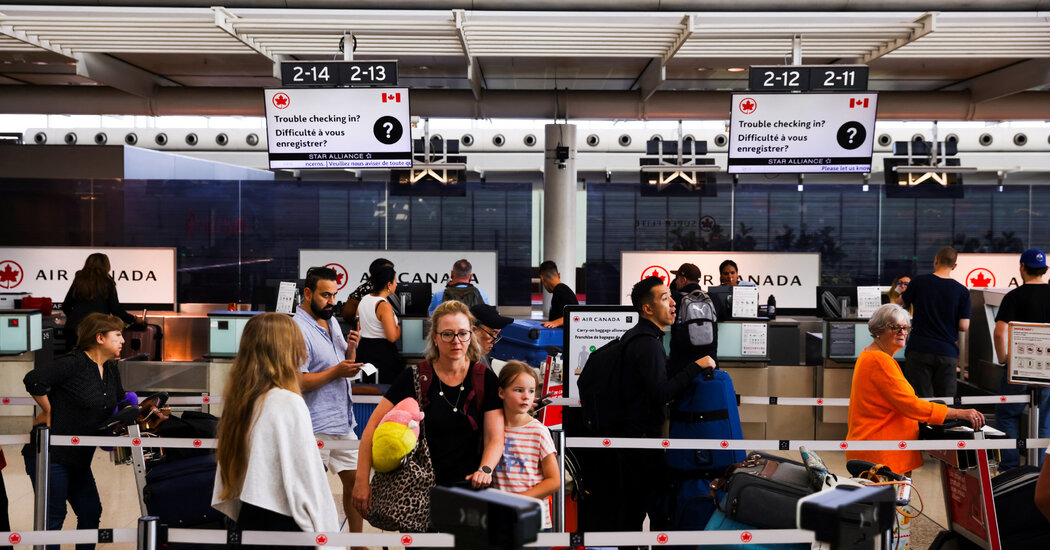Air Canada’s 10,000 flight attendants went on strike early Saturday, shutting down Canada’s dominant carrier and potentially stranding about 130,000 passengers each day.
The strike was confirmed by Hugh Pouliot, a spokesman for the Canadian Union of Public Employees, of which Air Canada’s flight attendants are members.
The attendants, 70 percent of whom are women, are seeking pay increases and to be paid for work they currently do without compensation before planes take off and after they land, what the industry calls groundwork.
Before the walkout, Air Canada said that it would ground all 700 of its daily flights starting on Saturday, and had already begun canceling flights to wind down operations in the days before. By Friday night, it said that it had canceled 623 already.
Even a short strike is expected to create travel chaos in a country where distance often makes flying the only viable form of travel. Air Canada also flies to 65 other countries, potentially leaving travelers stranded overseas.
The airline had said it would attempt to rebook passengers on other carriers. But the summer travel period and a lack of capacity on its smaller domestic competitors was already making that difficult.
On Friday, the workers’ union rejected a request from the company to enter arbitration to avoid a walkout. Arbitrators rarely introduce major new changes — like groundwork compensation — in contracts they impose.
“We will not surrender our constitutionally protected right to strike,” Mr. Pouliot said on Friday.
Air Canada had also asked the government to force the union to enter arbitration. Government-mandated arbitration, however, is normally used to end long and disruptive walkouts, not to block a strike before it begins. The government has not indicated its position on arbitration.
Over the past few days, Patty Hajdu, Canada’s labor minister, had continually urged the two sides to resume direct negotiations.
Before Air Canada began canceling flights on Thursday, the union issued a notice that it intended to strike early on Saturday. The airline responded with a similar notice, saying that it planned to lock out the flight attendants at about the same time.
The strike will not affect about 300 separate, regional flights generally offered on small propeller planes that are operated by two small carriers under contract to Air Canada, the company said.
At Toronto Pearson International Airport on Friday afternoon, contrite Air Canada staff were fielding questions from dozens of stranded travelers and handing out candy bars, water and nut-free granola bars.
Many of the passengers seeking in-person help at Pearson had booked travel through agents and could not manage their bookings online.
.
Judith Djaha, 52, had been visiting family in Toronto from Cameroon and had booked her return flight through an agent back home. Only after arriving at the airport to check in did she find out that her flight to Brussels, where she was supposed to board a connecting flight on another carrier, had been canceled.
“They can’t tell me when I can travel, and they also can’t tell me what will happen to my flight from Brussels to Cameroon,” she said.
David J. Doorey, a professor of workplace law at York University in Toronto, said the government’s use of arbitration to avert disruptive strikes was already being challenged in court by the Teamsters. He anticipates that if the government attempts to end the flight attendant’s strike by imposing arbitration, their union would join that legal action and the courts were likely to rule against the government.
Employers, he said, have come to expect the government to intervene to block disruptive strikes. That has given companies the sense that “there is good reason to hold back on making your best offer,” he said, adding that they think they “can do better before an arbitrator.”
A poll released on Friday by the Angus Reid Institute, a nonprofit public opinion firm, found that 59 percent of Canadians believed that Air Canada should pay its attendants the full hourly rate for work they do on the ground.
Jan Wong, an academic, journalist and author, received a series of texts from Air Canada on Thursday initially indicating that her flight that day back to Toronto from Fredericton, New Brunswick, had been delayed because of mechanical issues. Then the texts indicated it had been canceled “because a labor disruption is impacting our operations.”
She said she initially considered renting a car, but rejected the idea because it would have been a 17-hour trip — assuming she could find a rental.
She was able to find a seat on another airline but not until Tuesday. Air Canada, apparently believing that it will still be flying, has booked her on one of its planes that day, as well.
“What a confusing mess,” she said.
Niraj Chokshi contributed reporting from New York.
Ian Austen reports on Canada for The Times. A Windsor, Ontario, native now based in Ottawa, he has reported on the country for two decades. He can be reached at [email protected].
Matina Stevis-Gridneff is the Canada bureau chief for The Times, leading coverage of the country.
The post Air Canada’s Flight Attendants Begin Strike, Crippling the Airline appeared first on New York Times.




